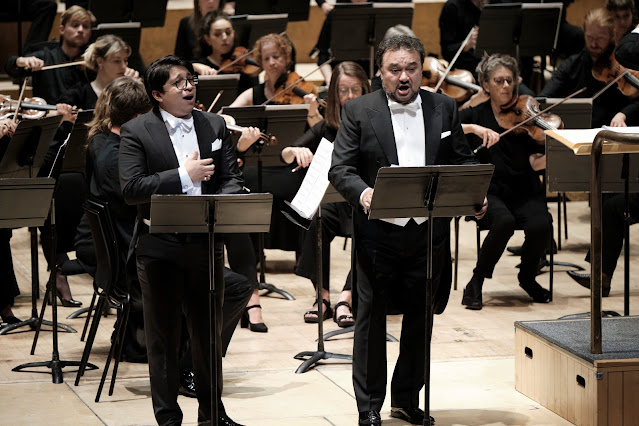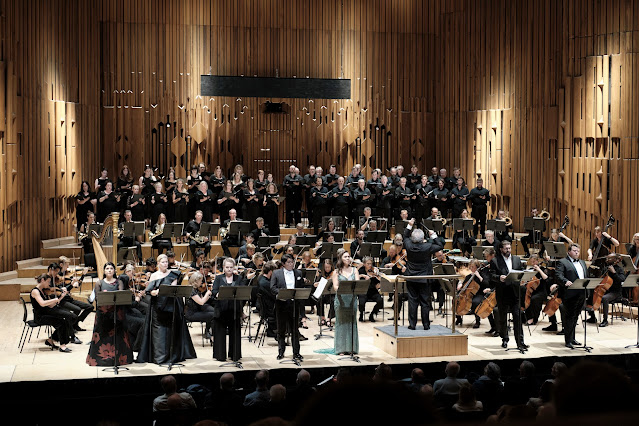 |
| Mercadante: Il proscritto - Iván Ayón-Rivas & Ramón Vargas - Opera Rara at the Barbican (Photo Russell Duncan) |
Mercadante: Il Proscritto; Irene Roberts, Ramón Vargas, Iván Ayón-Rivas, Elizabeth DeShong, Sally Matthews, Goderdzi Janelidze, Opera Rara Chorus, Britten Sinfonia, Carlo Rizzi; Opera Rara at the Barbican
Reviewed 28 June 2022 (★★★★★)
Mercadante is the nearly man of Italian opera, with a successful career lasting from 1819 to the 1860s yet never quite achieving the level of prominence, or historical endurance, of his contemporaries. Opera Rara has already espoused three of his operas over the years and last night (28 June 2022) the company presented Mercadante's Il proscritto at the Barbican Hall, following recording sessions. Carlo Rizzi conducted the Britten Sinfonia and Opera Rara Chorus, with Irene Roberts, Ramón Vargas, Iván Ayón-Rivas, Elizabeth DeShong, Sally Matthews, and Goderdzi Janelidze.
Il proscritto dates from 1842, when it was premiered Naples where he was Director of the Naples Conservatory. The premiere was not a great success, and the manuscript lay in the conservatory's library until 2020 when Carlo Rizzi, artistic director of Opera Rara, discovered it and the company decided to revive the work. A new edition has been created by Roger Parker and Ian Schofield, which is available via Casa Ricordi.
During the 1830s, Mercadante had produced a series of works which are regarded as 'reform operas', aimed at changing the structure of Italian bel canto operas and their reliance on the soloists as vehicles for display. He was partly spurred on to this after witnessing the premiered of Meyerbeer's Les Huguenots in 1836, and Mercadante would write "varied forms, cabalettas banished, crescendos out, vocal lines simplified, fewer repeats, more originality in the cadences, proper regard paid to the drama, orchestration rich but not so as to swamp the voices, no long solos in the ensembles", though contemporary critics complained about the resulting works' lack of melodic invention.
 |
| Mercadante: Il proscritto - Elizabeth DeShong, Irene Roberts & Carlo Rizzi - Opera Rara at the Barbican (Photo Russell Duncan) |
By the 1840s, Mercadante seems to have walked back from this point to some extent. Il proscritto does have cabalettas, including one that is pure Rossini, but the three act finales are remarkably innovative and daring, and his approach to the orchestra and to the dialogue was new and pointed the way forward. As a point of comparison, 1842 would also see the premiere of Verdi's Nabucco, it would be another decade before Verdi wrote his trio of masterpieces, Rigoletto, La traviata and Il trovatore, and would start his own innovations in operatic structure.
The libretto of Il proscritto is by the distinguished poet Salvatore Cammarano who wrote many librettos for Donizetti including Lucia di Lammermoor (1835) as well as for several of Verdi's early opera. Indeed, the plot of Il proscritto seems almost to be an attempt at a re-run of Lucia di Lammermoor but shorn of the more extreme bel canto elements.
Set in Scotland during the Interregnum, Malvina Argyll (Irene Roberts) has lost her husband Guido (Ramón Vargas) and father in a shipwreck. They were both Royalists, but urged on by her mother, Anna (Sally Matthews), Malvina is now marrying a supporter of Cromwell, Arturo Murray (Iván Ayón-Rivas). The opera opens on the day of the wedding, but Guido returns as well, causing great shock to Malvina, leading to a huge ensemble of confusion at the end of Act One, though Guido has refused to say who he is. In Act Two, we witness the two men in Malvina's life arguing and vowing to duel, Malvina's brother Odoardo (Elizabeth DeShong) gaining the help of Royalist exiles for Guido's rescue, and an angry scene between Malvina and Guido just prior to his escape, his discovery, and another act finale of confusion, when Guido finally reveals who he is. Act Three, during which Arturo must decide Guido's fate, features a complex duet between Arturo and Malvina, who is torn between the two men. Guido and Arturo's resumption of their arguments is interrupted by Malvina's appearance having taken poison and her death scene is the opera's finale.
There are several unusual aspects to the work, the fact that it uses two tenors (Guido and Arturo), and both are robust voices, neither indulges in the high tenor antics of Rossini's Neapolitan operas. The heroine is a mezzo-soprano, her brother is a contralto, and the work's main sopranos, the heroine's mother and her maid, are minor characters.
Then there is the construction. Act One is the most traditional, though the opening scene with its significant on-stage banda is rather remarkable, but then both tenors get a double aria to introduce themselves, whilst Malvina and Odoardo have a fine, rather traditional duet. But the end of the act introduces us to Mercadante's concept of a large-scale finale that is not soloist led, instead there are ensembles, chorale like passages and some remarkably inventive writing, and this is repeated for the end of Act Two. The engine of the opera, however, is in its duets in Acts Two and Three, one for the two tenors, and then Malvina has a powerful duet with each of the men. In fact, Malvina never gets a solo, as her death scene is a remarkable lyric scene rather than the traditional finale; it is far closer to Violetta's death in Verdi's La traviata than to the large-scale set pieces that Rossini gave his dying heroines.
In the duets, Mercadante largely eschews the traditional construction and follows the drama and the changing emotions, creating more free-form pieces. Mercadante's handling of the dialogue is forward-looking too. He writes short lyric sections which are often linked via orchestral passages which demonstrate his harmonic interest, and it is these sections which seem the most forward looking, hinting at the sort of free-form dialogue narrative writing that would become the staple of opera.
Where Mercadante falls down, perhaps, is that though he is able to write lyrically expressive melodic lines that work within the context of the drama, he never comes up with any ear worms. After the first listening there was little that you came out of the theatre humming.
The performance was on a high level throughout and the four leading roles, Ramón Vargas (Giorgio Argyll), Iván Ayón-Rivas (Arturo Murray), Irene Roberts (Malvina Douglas), Elizabeth DeShong (Odoardo Douglas) were well supported by the myriad smaller roles, Sally Matthews (Anna Ruthven), Goderdzi Janelidze (Guglielmo Ruthven), Susana Gaspar (Clara), Alessandro Fisher (Osvaldo), and Niall Anderson (An official of Cromwell). The function of these smaller roles was to support the dialogue, and to contribute to the first two act finales.
Roberts made a moving heroine, really articulating her emotional distress. The opera is basically about her being genuinely torn between her two husbands, and choosing at the end to be with neither and so be true to both. Roberts has a fine, light yet focussed mezzo-soprano voice with a plangently expressive sense of line that she used finely in the lyric dialogue and in her moving death scene.
Elizabeth DeShong's Odoardo was perhaps the most conventional of the main roles. DeShong and Roberts had a lovely, large-scale duet in Act One where the two voices blended and contrasted finely, with DeShong mining her wonderful lower register. Then in Act Two DeShong got to really shine in Odoardo's double aria, contrasting lyrically expressive cavatina with startling Rossinian roulades in the cabaletta.
The two tenors, Vargas and Ayón-Rivas were well matched. Vargas displayed fine, robust tone and a commitment to the drama whilst Ayón-Rivas has a brighter, more incisive approach. Both impressed in their opening arias, but it was in their fierce Act Two duet that that sparks really flew. Here Mercadante followed the drama, and the two singers really followed him thus creating something that was both innovative and thrilling. Vargas' Act Two duet with Roberts was fierce, yet complex as she articulated how torn she was, whilst Ayón-Rivas's duet with Roberts in Act Three was remarkable for how the two artists articulated the complexities of the character's changing emotions. Neither of these duets was conventional in form, and display was far from Mercadante's mind, yet all three performers made them thrilling and gripping. Neither of the men, Arturo and Guido, is particularly appealing. The opera makes it clear that they both love her, yet they are more interested in their rivalry than what Malvina wants, and neither Vargas nor Ayón-Rivas tried to make their character more likeable than he was. This was a performance that went with the drama.
The smaller roles were all strongly sung, Sally Matthews was perhaps somewhat wasted as Anna and Susana Gaspar popped up rarely as Clara, though both impressed. Goderdzi Janelidze was wonderfully black voiced and made a highly distinctive contribution to the drama, whilst Alessandro Fisher was a characterful leader of the castle guards. Niall Anderson was the consummate professional in the tiny role of Cromwell's official, and I hope to hear more of him.
The chorus was in strong voice, and whilst Mercadante's innovations did not really stretch to unusual choral writing there was plenty of interest for them to get their teeth into. It was in the orchestra where real interest lay, and Carlo Rizzi drew finely expressive and fluid playing from the Britten Sinfonia. Unusually for an Italian opera of this period, the orchestra had a voice of its own and encouraged by Rizzi, the Britten Sinfonia was on top form.
 | |
| Mercadante: Il proscritto - Susana Gaspar, Sally Matthews, Elizabeth DeShong, Irene Roberts, Carlo Rizzi, Goderdzi Janelidze & Alessandro Fisher - Opera Rara at the Barbican (Photo Russell Duncan) |
At first sight, Il proscritto can appear to be Lucia di Lammermoor without the mad scene, but the drama and the innovations Mercadante's writing mean that the piece works superbly. All the performers gave fully committed, positively thrilling performances that revelled in Mercadante's approach to drama. Now, having been resuscitated by Opera Rara for the first time in 180 years, we surely deserve a staging of the opera.
This review also appears on the Opera Today website.
Never miss out on future posts by following us
The blog is free, but I'd be delighted if you were to show your appreciation by buying me a coffee.
Elsewhere on this blog
- An afternoon delight: Anna Morrisey's inventive production of Rossini's The Barber of Seville at Nevill Holt Opera, in a finely musical performance conducted by Dinis Sousa - opera review
- Poetic drama & real musicality: highly imaginative Rusalka from Jack Furness at Garsington with Natalya Romaniw as a compelling water nymph - opera review
- Obsessed by voices: pianist Dylan Perez on recording the complete songs of Samuel Barber - interview
- Closeness & distance: Friedrich Cerha's evocation of Viennese traditional music in a new version for Viennese Schrammel quartet - record review
- Never such innocence: Benjamin Hewat-Craw & Yuhao Guo in RVW, Butterworth & Gurney - record review
- The Lost Art of Frances Cole: recordings from the 1970s provide a glimpse of the art of the Black American harpsichordist - record review
- Giving voice to unconventional instruments: the Lawrence Graduate Bayreuth Tuben Quintet - record review
- Madcap theatre & magnificent music: Janacek's The Excursions of Mr. Brouček at Grange Park Opera - opera review
- A strong affinity to melodic music: I chat to composer John Brunning about his works for guitar - interview
- Strong meat: Grange Park Opera stages Ponchielli's rarity, La Gioconda in a performance that full embraces the work's drama - opera review
- Rising to the challenge: the Young Artists of the National Opera Studio in Sondheim: Before & After - opera review
- Vivid & vibrant: Poul Ruders' Harpsichord Concerto from Mahan Esfahani, Aarhus Symphony Orchestra, Leif Segestam - record review
- Young Artists performance of Tchaikovsky's Eugene Onegin at Opera Holland Park - opera review
- Home

.jpg)









No comments:
Post a Comment